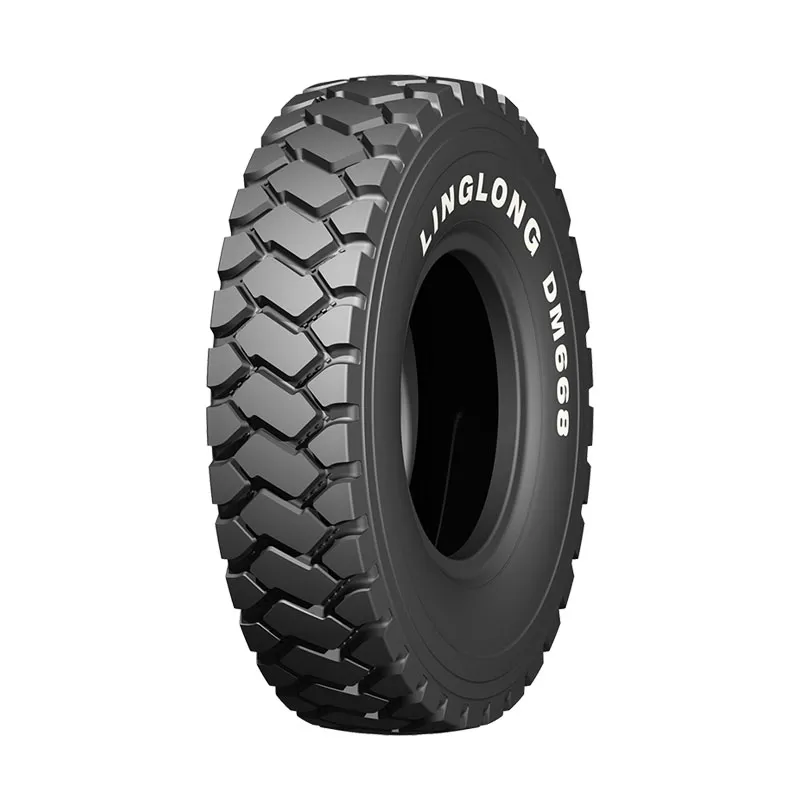Applications of Rigid Dump Truck Tire
2024-07-25
Rigid dump truck tires are designed specifically for use on rigid dump trucks, which are heavy-duty vehicles used for transporting large quantities of material in mining, construction, and other heavy-duty applications. These tires are built to handle extreme conditions and heavy loads, providing durability, traction, and safety. Here’s a comprehensive overview of rigid dump truck tires:
Features
1. Construction:
- Tire Type: Typically radial or bias-ply construction, with radial being more common in modern tires due to better performance characteristics.
- Tread Pattern: Features deep, aggressive treads designed for traction on various surfaces, including loose gravel, mud, and uneven terrain.
2. Load Capacity:
- High Load Ratings: Built to support the heavy loads of dump trucks, often with high load indexes and reinforced sidewalls.
- Durability: Designed to withstand the stresses of off-road driving, including impacts from rocks and rough terrain.
3. Materials:
- Rubber Compounds: Made from specialized rubber compounds that resist abrasion, cuts, and punctures, enhancing durability and longevity.
- Reinforcement: Often include steel belts or other reinforcements in the tread and sidewalls to provide added strength and resistance to damage.
4. Size and Specifications:
- Tire Size: Available in various sizes to match different dump truck models and applications. Common sizes include 27.00R49, 29.5R25, and 33.00R51, among others.
- Sidewall Markings: Include important specifications such as load index, speed rating, and recommended operating pressures.
5. Performance Features:
- Traction: Designed for optimal traction in off-road and challenging conditions, including wet, muddy, and uneven surfaces.
- Heat Dissipation: Engineered to manage heat buildup during operation, which is crucial for maintaining tire performance and extending lifespan.
Benefits
1. Enhanced Durability:
- Long Service Life: Built to endure harsh operating conditions, leading to a longer service life compared to standard truck tires.
- Resilience: Withstands impacts and abrasions from rough terrain, reducing the likelihood of tire failures and downtime.
2. Improved Traction and Stability:
- Off-Road Capability: Provides excellent grip and stability on loose and uneven surfaces, ensuring safe and efficient operation in mining and construction sites.
- Load Handling: Capable of handling the heavy loads typical of rigid dump trucks, improving overall vehicle performance and productivity.
3. Safety:
- Reduced Risk of Blowouts: Reinforced construction and high-quality materials help prevent blowouts and tire failures, enhancing safety for operators.
- Improved Handling: Provides better handling and control in challenging conditions, reducing the risk of accidents and improving operational efficiency.
4. Cost-Effectiveness:
- Lower Maintenance Costs: Durable tires reduce the frequency of replacements and repairs, lowering overall maintenance costs.
- Operational Efficiency: Reliable tires contribute to smooth and efficient operation, minimizing downtime and improving productivity.
Applications
1. Mining:
- Heavy Hauling: Used in mining operations to transport ore, waste, and other materials from excavation sites to processing or storage areas.
- Rough Terrain: Designed for use on rugged and uneven terrain typically found in mining environments.
2. Construction:
- Material Transport: Used to haul construction materials such as soil, gravel, and demolition debris across construction sites.
- Heavy Loads: Handles the heavy loads associated with construction and earthmoving tasks.
3. Quarries:
- Stone and Aggregate Transport: Used to transport large quantities of stone, aggregate, and other materials from quarries to processing or distribution points.
4. Forestry:
- Timber Transport: Used in forestry operations to transport logs and other materials from logging sites to processing facilities.
Considerations
1. Tire Size and Specification:
- Compatibility: Ensure that the tire size and specifications match the requirements of the dump truck model and application.
- Load and Speed Ratings: Verify that the tire’s load index and speed rating are suitable for the intended use and operating conditions.
2. Operating Conditions:
- Terrain: Choose a tread pattern and tire design that are appropriate for the specific terrain and conditions where the dump truck will be operating.
- Weather: Consider the impact of weather conditions such as rain, mud, and snow on tire performance and select accordingly.
3. Maintenance:
- Regular Inspections: Perform regular inspections of tires for signs of wear, damage, or irregularities.
- Proper Inflation: Maintain proper tire inflation levels to ensure optimal performance, load-carrying capacity, and safety.
4. Cost and Budget:
- Initial Investment: High-quality rigid dump truck tires can be a significant investment. Consider the long-term benefits and cost-effectiveness when making a purchase decision.
- Total Cost of Ownership: Factor in maintenance, fuel efficiency, and lifespan when evaluating the overall cost of the tires.
Conclusion
Rigid dump truck tires are essential components for ensuring the efficient and safe operation of dump trucks in heavy-duty applications. Their robust construction, high load capacity, and specialized design make them well-suited for demanding environments such as mining and construction sites. Proper selection, maintenance, and management of these tires are crucial for maximizing performance, durability, and overall cost-effectiveness.



